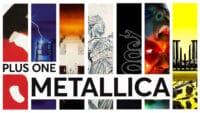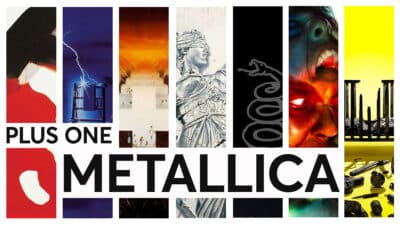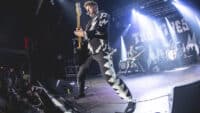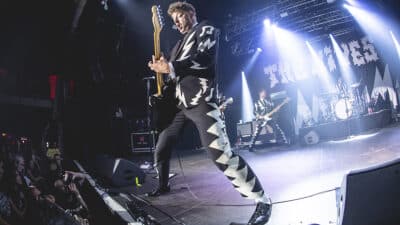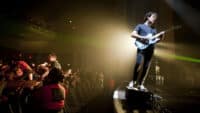Interview
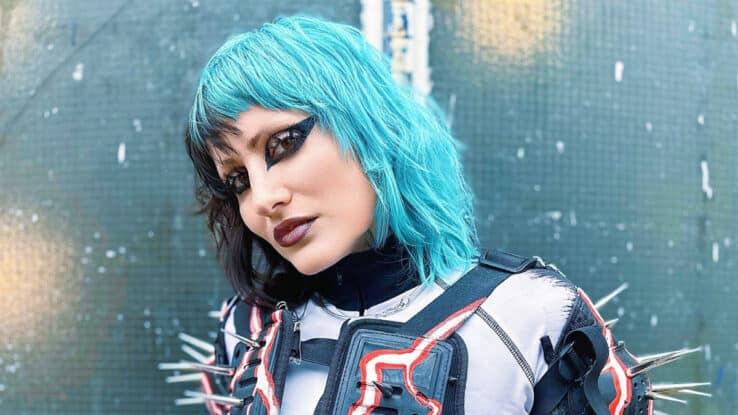
Interview
RØRY: “I remember feeling so ashamed of my age for so many years”
The fast rising alt star on beginning a music career in her 30s and processing trauma through songwriting
There’s nothing evasive about RØRY. Both in conversation and through music, she is unafraid to tackle life’s darker, messier topics head-on. Blending confessional singer-songwriter lyrics with a finely-tuned talent for earworm alternative pop, RØRY’s first two EPs have explored self-worth, mental health, addiction and family trauma with skill, sensitivity and explosive feeling. It’s a cocktail that saw her sidestep the music industry’s preconceptions about who a breakthrough artist should be and allowed her to find her audience on TikTok. Taking to the app to share original songs, RØRY quickly built a loyal, all-ages following.
In February, she’ll playing her biggest live show to date when she headlines London’s Electric Ballroom, the first stop on a UK tour that will carry her across the country to meet many of these fans for the first time.
We caught up with RØRY ahead of the tour to talk about the journey from songwriter to artist, agism in the music industry, and why educating on ADHD has become such an important part of her life.
How are you feeling ahead of the tour?
I am looking forward to it. But it’s equal parts excitement and fear. I’d done a lot in my 20s, but that was with the benefit of alcohol, and I don’t drink anymore. It’s very different doing it now. My first show as RØRY was last August, with 200 people. Then I was meant to play the Underground, but that sold out, so we ended up going to Islington Academy, and then Electric Ballroom. So it’s quite a big change for the old nerves. Hopefully, we’ll find some excitement along the way.
It definitely must be scary, but how exciting that it’s all moved that quickly.
Yes, it’s cool. And I have to be honest, I’m very grateful because I am a lot older than most people beginning their music career. So every time something kind of jumps a step, I’m like, “Okay, thanks. I got a year back.” I’m still pretty surprised that it’s happened, and how quickly things have worked out.
There’s obviously still this prevailing idea that if you want a career in music, especially as a woman, you’ve got to get out there at 18. As you said, you’ve been involved with the music industry in one form or another since you were in your 20s. If you’d been on this path back then, how do you think you would have dealt with it?
Very badly. I would have dealt with it very badly. You know, I had a lot of unprocessed trauma, I had a lot of addiction issues that were brewing. Had that carried on… I had some success in my 20s, but luckily not enough to do myself any real damage. I’d have just been a horror show that we hear about a lot of the time. I wasn’t mentally ready to do it. I didn’t have any stability in my personal life. My whole worth as a person came from music. So when things didn’t work out, it was very damaging.
And I think it’s really important to speak about that perception of having to be 18 when you start music, because it’s so true. I’ve spent many years as a songwriter behind the scenes, and I’ve heard so many times, “Oh, we’ve got a new artist we want you to work with.” And then someone in the room says “How old?” “21.” “Ooh, bit old.” Or when people get to their mid 20s and they haven’t made it, they’re considered past it. And you’re meant to just go quietly and become a songwriter, which I did for a while. But then for some reason, the unhinged side of me said, “Let’s do this again in your late 30s”.
I remember feeling so ashamed of my age for so many years, so upset, with a bit of a victim mentality to be honest. I had this feeling of, “it’s so unfair that I’m past it. I wish the world was different”. It’s cool to no longer think that it’s too late for me. I just think “f*ck it. I’m just gonna go and do it, and we’re gonna see what happens.” I hope that people see how old am I now – I’ve just turned 39, I’m almost 40 – and I hope that can be inspiring to other people. Especially if maybe they’re neurodivergent or they’ve had addiction issues, or any kind of struggle in life. It ain’t over yet. There are plenty more chances in life, but you just have to go and take them, and kind of not give a f*ck about the normal system.
You said that in your 20s you were quite dependent on music and it was quite tied to your self worth. What’s your relationship like with it now?
Now, it’s kind of beautiful, I must say. I use it as a tool for self expression and that’s it. I think it’s what music was meant to be. I spent many years as a songwriter and that’s a little bit of self expression with a little bit of “how do we make money” – it’s a very different thing. When I was younger, it was, “How do I just get something good enough that people will like me?” And now, when something comes up in me, even before I’m able to verbalise it, I just come up to this room and begin a little chorus or an idea. And that’s it, that’s all it is. It’s just little moments of me not being able to deal with a particular emotion and then it coming out in songs. It’s pretty cool.
When you write songs now, how much does that commercial, professional songwriter side of your brain affect your process?
It depends on the mood that I’m in. There are some lines that I write that are vulnerable, maybe embarrassing, and now I’m good just letting it slide. But there is a part of my brain, and it’s probably the songwriter part (and probably slightly the people pleaser part), desperate to finally achieve my gifted kid potential that has been evading me for so many years, that wants to have a big single. I do often try and put maybe one song that’s a little bit poppy or that I think people might resonate with more. I always get it wrong. It won’t be the one people like. If anything, it’s an argument to just stay true to what you’re really feeling because you can’t guess what’s going to be popular.
Let’s talk about Family Drama. What made you want to write about family?
Well, I didn’t actually. The EP was originally something totally different. I think it was called Comeback Kid and it was almost positive – as positive as I was gonna get, anyway. As I was in that process, I was going through some really difficult stuff. I haven’t spoken to my brother for years, that’s been a no contact relationship for a while, and I’m walking down the same path with my dad, which was even more brutal. You’re kind of genetically coded to need and love your parents. It’s very difficult to stop contact, and I just coped with it… I don’t want to say horrendously, because that would be shaming myself, but I found it very difficult. I couldn’t get through it. I was constantly either upset or angry, ruminating over things that had happened in the past, and just trapped in a negative place.
I went back to therapy to help me process what it means to go no contact with a parent, to unpack those dysfunctional dynamics and what that has done to me as a human being. And as I was doing the therapy, I was realising things that I never knew. I never knew that growing up, being screened out or being hit or being in an environment where there are loads of affairs, I never knew that that was not normal. My dad would always say, “If you look underneath every family, they’ll all be like this.” So you really believe it’s normal. I’m realising it wasn’t. And actually, some kids are respected and spoken to calmly at home. That was a real shock to the system. And those massive emotions, the sadness and the rage, I didn’t quite know how to process it. Very quickly, it just felt like the whole EP was going to be about family dynamics. Which is a bit strange, because, you know, my songs are about relationships. To write about family felt a bit odd, but it was so true to what I had been going through for the last year. It’s actually about a year now that I’ve had no contact with my dad. So it really it’s just the diary of that.
Was that a healing process at all, writing the EP or did you find it quite difficult?
I don’t know. I’d love to say it was healing. Maybe it was healing, but it hasn’t healed me. One of the things that I was denied was a voice. For example, the one thing you couldn’t speak about in my family was the affair. If you spoke about that, you’d be shamed, screened out, told to move on. And obviously, the things that you’re denied to feel only make them bigger within you. I hadn’t spoken publicly about all the affairs that my dad had, how it ruined my mum’s life. So to be able to write about that and use my voice was healing in a way, because I’d been silenced for so many years, made to feel crazy, stupid and a problem. It felt like reclaiming something, to use my voice.
But it also came with so much fear, because even though we weren’t in contact, I imagine my dad will maybe listen to those songs, and then be sat around the family dining table going, “Can you believe what she’s done?” It will be that story of me being horrible and a problem. When you speak about the issues in a dysfunctional family, you actually invite yourself to be attacked and ostracised even more. That scared the sh*t out of me. A little bit healing, a little bit scary, but I am glad that I did it.
It must be a strange position to be in, being no contact with someone but releasing music publicly, which is almost a form of indirect communication. Is that something that’s on your mind as you’re writing the songs?
100%. I think the song that I felt that strongest with was ‘the apology i’ll never receive’. I wrote myself what I would want to hear from my dad, which came from a conversation in therapy, and I thought, oh my god, that would make a really good song. That song just destroyed me. I had to leave the studio, I could not record it. When I did the music video, I started crying. It’s right on the pain point. I really have thought so many times, what would he think if he ever heard this song? And there’s still this really sad, desperate part of me that thinks maybe he’ll hear it and go, “Oh, wow. She has been struggling. Maybe I should have been there more after her mum died. Maybe she did deserve an apology for all those years of affairs.” It brings up this real desperation to be seen and be liked by him. Which is hard to deal with. Then on the other side, there’s a slight f*ck you energy in it, which is like, “I know that you don’t like me. You hate me talking about this stuff. I know you’re going to be slagging me off. Well, f*ck you. That’s what you get”. It’s strange, this massive desperation but also anger and power.
Do you have any apprehension about playing songs like this live, when they come from such a raw and vulnerable place?
I have no doubt that I will be crying on stage during that song. What I hope for is maybe what I found on my last tour, because I had a song about my mum dying that just also did this to me. It was just destroyed me. But as the tour goes on, you get more desensitised to it, and you can regulate in the moment. So by the end, I was able to sing this song about my mum dying, and be okay.
What I think about this song is, maybe the first couple of shows, we’re going to miss a chorus. But by the end of it, I will have become almost desensitised. It’s an interesting experience. That was one of the most powerful moments from my last tour. It’s a song called ‘Jesus & John Lennon’ and people would put their hand up if they’d lost a family member. And other people in the audience would give them a cuddle or put their hand on them if they were comfortable, and we’d raise our lights. It was really powerful and really emotional. I don’t want to stray away from that. If I have a little tear up, it’s all good. If anything, that shows how upsetting it is to not be understood by a parent that you desperately need. I think it’s good to feel those things. If that means me crying on stage, then so be it.
You’ve had a very varied career, especially over the last few years…
Welcome to ADHD.
Let’s start with the writing you’ve done for other artists. When did that start?
I’ve written for other people from the age of about 20. Not as a job, just like drunk in a pub with some mate that was a singer. I’d pick up a guitar and write, and then I ended up writing in dance music for a while because my brother was a DJ. So it wasn’t really a job, I just found myself in various studios and after-parties, and I would write songs. It’s something I found quite easy. It wasn’t until I got sober that it became something I wanted to commit to and pursue in a professional way, and that was very different. That was going to the studio every day for six or seven hours to write a song every day.
My first successes there were in dance music, because that was where I’d spent a lot of my 20s for various reasons. And that was a wild experience. I have hit records all about like, going out and having fun and getting drunk, written in the year that I got sober, after destroying my life with alcohol and drugs. So it’s really quite ironic. But I’m so grateful because writing for others, when I did it properly, allowed me to sidestep how much I hated myself, my own fear of showing up, my own shame about my age. You’re not seen when you’re the songwriter, you’re behind the scenes. And when, fairly early on, I got a couple of hit records, it changed something in my mindset. You’re not supposed to get a hit record after six months of songwriting, especially not more than one. And I realised that everything I thought I knew – which was that I’m undeserving and this will never happen for me – might not be right. And what happens if you expand that? Where else am I feeling undeserving? Where else can miracles happen?
Were there any songs that you wrote in that period that made you particularly keen to restart your solo career and keep for yourself?
I don’t think so, actually. They’re just so different. And it’s quite funny actually, because I do sometimes still go to a pop dance camp. I turn up all emo and brooding, and I stand out like a sore thumb. But I actually think that’s quite nice because I can’t imagine writing a song and loving it, and then having to give it away, which happens to a lot of songwriters. That’s just never happened to me because I went off and started doing my own project. And it was so different and dark and heavy. I just got to own that completely.
It feels like from the start you had a very specific idea of what you wanted your music to sound like and what you wanted your identity as an artist to be.
100%. It was everything that didn’t fit in the pop dance world. I’d often get told, “Well, that’s a bit dark. That’s a bit personal. Nobody would relate to that. No, we need to water it down”. And it used to really upset me. And then actually, all those comments, they were right about pop music, sure. But I was obviously just this artist in waiting, desperate to say more. And then I was able to go and carve out this offshoot and say all that dark personal stuff over on the other side.
What was the first step on that road for you?
Oh, it was joining TikTok when I was 36, and feeling so embarrassed about doing that. But I just needed somewhere to sing my own songs, and to write the dark and heavy stuff that was on my heart. So I would just have acoustic guitar backing tracks and I’d write choruses. I don’t know what my expectation was, I think it was only to be brave enough to show up and do it. But early on, a couple of those went viral. That’s the only reason why my artist career really began, because I went viral. That was a little boost of self esteem. And then I’d do another one. And that would go well, and then I released one that got a million streams. So it was just this lovely interaction between me and an audience that I hadn’t had for such a long time. It’s just like oxygen when you’re suffocating. And carried me the whole way up until Electric Ballroom.
You’ve created a few really positive online communities – you have your other TikTok page, ADHD Love, as well. What drove you to create that?
I wish I could say I had some kind of grand plan. It was really just a joke to start with. I just found out I had ADHD, and had gone on this mega hyper focus on everything abour ADHD, which you do. And one night I was in bed, and – this is very, very personal but here you go – I always used to forget to wear sanitary products, and I would roll my own tampons. And my partner was aware of this so he would check in with me. So one night I was in bed, and he was like, “Babe, just checking that you’ve got a tampon in?” And I said yes. And he said, “Is it real or self rolled?” And I said, “real?” And he said, “Well done.” And I went, “wow, that would make a really funny TikTok – who’s out there talking about self-rolled tampons?” And he said, “Sure, we’ll do it on the weekend.” I said, “No, we’ll do it now.” So at 23:30 that night, we made our ADHD Love TikTok account. And lo and behold, the first video went viral.
That was really funny. But we were then given an opportunity to really speak to people and help. And that has become a full-time mission for both of us over the last two years. It’s just the most wonderful thing to meet all these people that have suffered and felt the same things, and to get to directly talk to them about what has helped me and what’s helped us in our relationship. It’s absolutely incredible to be able to help people after living a life of so much sadness and chaos.
What was that like, getting that diagnosis in your 30s?
Equal parts joy and grief. The joy is, I’m not broken, I’m not a horrible person, I make sense. I actually need help. When you’ve struggled your whole life trying to be neurotypical, trying to be clean, trying to be on time, trying to be organised, failing, failing, failing, failing, your self-esteem is driven into the ground. Then you get this diagnosis and it lifts you. You aren’t that, stop trying to be that, let’s just get you help where you are. And that’s wonderful. But then there is this feeling of wishing you had known sooner. I’ve had 20 years of self medicating with alcohol, massive emotional problems, family problems. And it’s all tied together. There are all these emotional dysregulation problems of ADHD and rejection sensitive dysphoria. When you put that into a difficult family dynamic, it just amplifies it. If I’d have known, if I’d had support earlier, it could have saved me and other people a lot of pain. But that’s why we’re so passionate about raising awareness now. So other people don’t have to live the way that I did.
When you look ahead in your career, what do you hope to see yourself achieve in the next few years?
I find it difficult to look into the future. I think that might be an ADHD thing. I don’t like putting things in my calendar more than a week in advance. However, if I was going to be sensible and slightly more mature…
Something I’m really aware of is that my first two EPs have been very heavy. I don’t mean musically, I mean subject matter. They have been quite negative; there’s been a lot of emotions that are perceived to be negative. And I had to walk through that. I had to walk through the grief of losing my mum and addiction messing up my life. And then more recently, not speaking with my dad, and family stuff. But actually, I live a really lovely life. I have a wonderful partner. After 10 chaos relationships, my mental health is really good, which means I can feel happy and sad, and not be consumed by either of them. I have a wonderful job. I’m sat here chatting to you about an upcoming tour. So everything’s pretty golden.
The one thing that I haven’t done yet in music is speak about hope. The next project I’m working on is my album because we’ve got to skip a few steps here. I want it to be hopeful. It will still be heavy but I don’t want people to feel lost in those emotions, as they may have done with my other two EPs. To inject a bit of hope – that’s my five-year plan.
RØRY’s UK tour begins at London’s Electric Ballroom on 29 February. Find tickets here.




